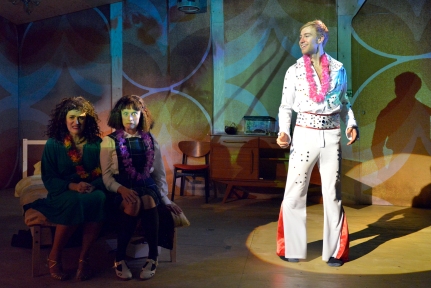
Faced-paced story, debauchery, coming-of-age stories, and live perfomances of ELO – could you ask for anything more? Well, maybe …
This offering from the National Theatre of Scotland might be a runaway hit, but I have a feeling that their fans won’t include the Catholic Education Service of the UK. Set in writer Alan Warner’s hometown of Oban (or, more fairly, a partially fictionalised version referred to as “The Port” in the original book The Sopranos), it begins at a school with an unusually high teenage pregnancy rate. But don’t worry, God told the Pope the perfect answer: give the girls of the town a sound moral upbringing by putting them in an all-girls school where nuns teach lessons that sex is a sin and the word “boys” is not allowed, because, like, that always works, doesn’t it?
Our Ladies of Perpetual Succour appeals to a lot of people in different ways, but the main audience for this play seems to be women with fond nostalgia of their youth. I’m not one of those people, because this is about as far removed from my teenage years as can be – I was more minded to sit through this debauchery with a middle-aged “harumph”. But for me, I instead got to enjoy marvelling at the extent of human stupidity – in this case, the stupidity of whoever thought this trip a choir contest was a good idea, bearing in mind it’s the first trip on their own for many of their girls. And it’s to Edinburgh, #2 city in Scotland for drinking after Glasgow, and #1 city for debauched hedonism. And to top it all off, with the contest not being until 6 in the evening, the girls are welcome to go off on their own for the day to see the city. Grief, what did they think was going to happen?
